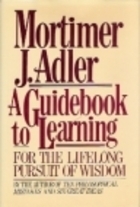What do you think?
Rate this book


163 pages, Hardcover
First published March 31, 1986
“If readers of this book, reaching this point, have a sense that what they have been offered so far does not give them the guidelines that this work promised to provide, I hope that what lies ahead will fulfill that promise reasonably well.”
"What, then, shall autodidacts do? How should persons proceed who wish to conduct for themselves the continuation of learning after all schooling is finished?
The answer is in one way very brief and simple. looked at in another way it is rich and substantial enough to occupy a lifetime of learning in the pursuit of wisdom.
The simple answer is: Read and discuss!”